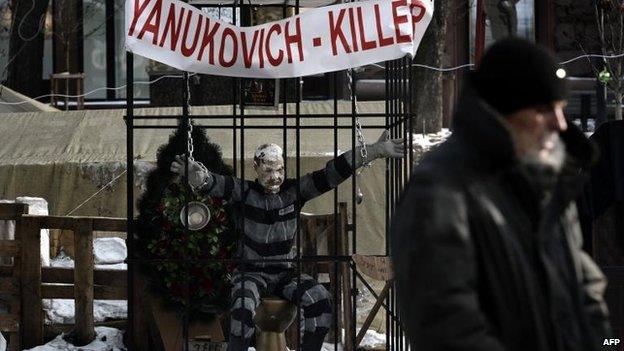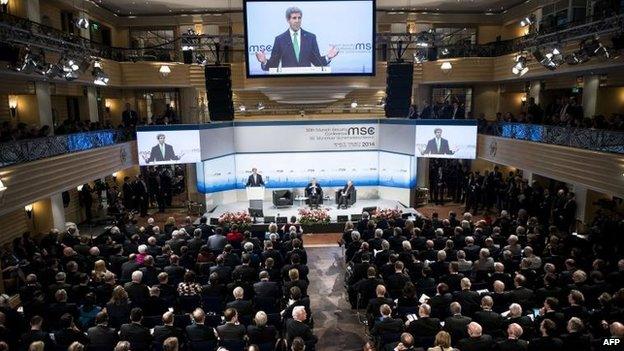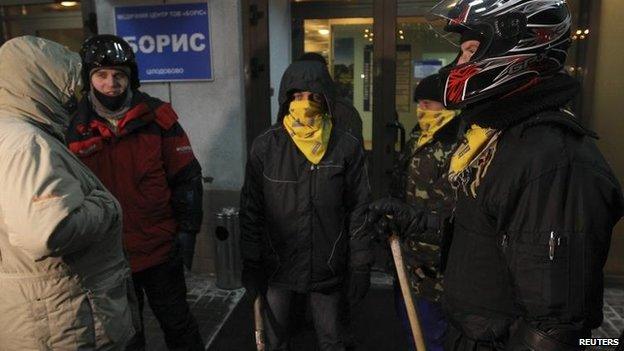Ukraine unrest: EU and US clash with Russia in Munich
- Published

Anti-government protests in Ukraine show no sign of coming to an end
Ukraine's future has sparked angry exchanges at a summit in Munich.
European Council President Herman Van Rompuy said the "future of Ukraine belongs with the EU" while US Secretary of State John Kerry said the US backed Ukraine's "fight for democracy".
Russian Foreign Minister Sergei Lavrov accused Western countries of double standards over violent protests.
Ukraine has been in turmoil since November, when it scrapped an EU accord in favour of a Russian bailout.
'Time on our side'
The security conference, external is an annual event held to discuss military and political affairs.
Herman Van Rompuy: "The future of Ukraine belongs with the European Union"
Mr Van Rompuy's opening speech referred to the EU's offer of close association with Ukraine.
"The offer is still there and we know time is on our side. The future of Ukraine belongs with the European Union," he said.
Mr Kerry launched a broad attack on "a disturbing trend in too many parts of Central and Eastern Europe and the Balkans".
He said: "The aspirations of citizens are once again being trampled beneath corrupt, oligarchic interests - interests that use money to stifle political opposition and dissent, to buy politicians and media outlets, and to weaken judicial independence."
Mr Kerry added: "Nowhere is the fight for a democratic, European future more important today than in Ukraine. The United States and EU stand with the people of Ukraine in that fight."
He said the "vast majority of Ukrainians want to live freely in a safe and prosperous country - they are fighting for the right to associate with partners who will help them realise their aspirations".
In an apparent swipe at Moscow, he added that "their futures do not have to lie with one country alone, and certainly not coerced".
Mr Lavrov said that a "choice is being imposed [on Ukraine] and Russia is not going to be engaged in this".
He asked: "What does incitement of violent street protests have to do with the promotion of democracy? Why do we not hear condemnation of those who seize government buildings and attack police and use racist, anti-Semitic and Nazi slogans?"

John Kerry had harsh words for corruption in eastern Europe and the Balkans

Opposition activists guard a private hospital in Kiev treating activist Dmytro Bulatov
Mr Lavrov said: "Why are many prominent European politicians actually encouraging such actions, although back home they are quick to severely punish any violations of the law?"
Interfax also quoted Mr Lavrov as saying: "When John Kerry... says that Ukraine should choose who it is with - with the whole world or with one country, Kerry - with his experience, good sense - is the last person I would expect such propaganda from."
Sergei Lavrov: "What does incitement of violent street protests have to do with the promotion of democracy?"
On Saturday, Mr Kerry met Ukraine opposition leaders including Arseniy Yatsenyuk and boxer-turned-politician Vitali Klitschko. He also met Ukrainian Foreign Minister Leonid Kozhara.
The White House has confirmed it is discussing possible sanctions against Ukraine with the US Congress.
Before arriving in Munich, Mr Kerry said that concessions from President Viktor Yanukovych had "not yet reached an adequate level of reform".
Mr Yatsenyuk, who heads the Batkivshchyna party, recently refused an offer from President Yanukovych to become PM, one of the concessions.
President Yanukovych, who is currently on sick leave, has also tried to ease the crisis by repealing anti-protest laws, signing an amnesty for protesters and accepting the resignation of his cabinet.
Duncan Crawford: "Dmytro Bulatov is accused of trying to instigate riots"
However, opposition leaders are calling for his resignation and early elections.
One key issue for Mr Kerry and the opposition leaders will be the issue of Ukraine protester Dmytro Bulatov.
He went missing for eight days and said he had been kidnapped and tortured by captors who spoke with Russian accents.
He is now in hospital in Kiev under guard from both police and anti-government demonstrators.
Both White House spokesman Jay Carney and EU foreign affairs chief Catherine Ashton said they were "appalled" by the apparent signs of torture.
US ambassador to Ukraine Geoffrey Pyatt went to the hospital on Saturday to try to meet Mr Bulatov but doctors did not allow him to visit.
Ukraine's interior ministry says it wants to interrogate the activist on suspicion of organising mass unrest, and to examine his account of torture.